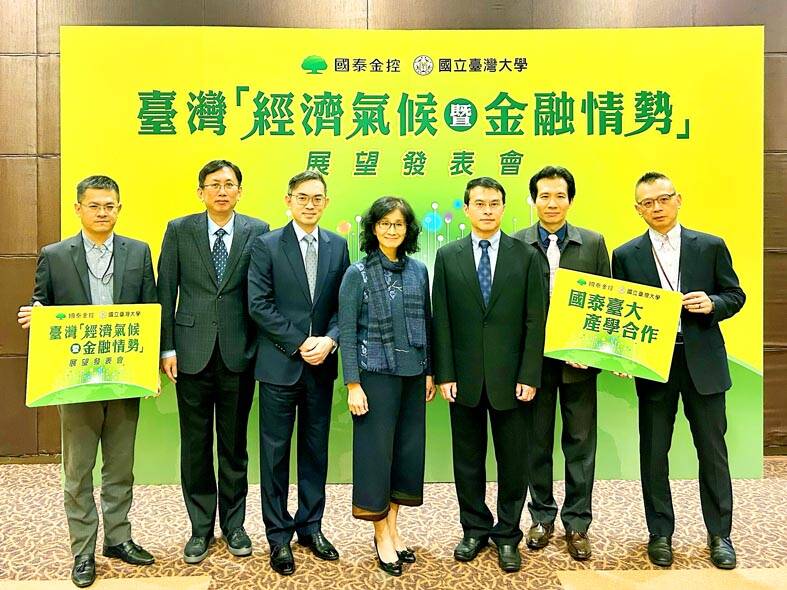Cathay Financial Holding Co (國泰金控) yesterday raised its forecast for Taiwan’s economic growth this year from 2.8 percent to 3 percent, saying that robust demand for artificial intelligence (AI) products would help exports come out of the woods.
The projection is lower than the 3.43 percent increase that the Directorate-General of Budget, Accounting and Statistics (DGBAS) predicted last month, as the research team is less optimistic about private investment and consumer spending.
“Upcoming electricity rate hikes would weigh on private consumption and corporate margins,” National Central University economics professor Hsu Chih-chiang (徐之強) said on behalf of the panel.

Photo: Wu Hsin-tien, Taipei Times
Policymakers and experts are due to review electricity rates this month. Government officials have indicated that rate increases across the board are necessary to reflect rising costs and to keep debt-ridden Taiwan Power Co (台電) afloat.
The electricity rate hikes, which are to go into effect next month, would also negatively affect corporate earnings, as industrial and commercial users face steeper adjustments, Hsu said.
As the DGBAS has said that every 10 percent increase in electricity rates would push up inflation by 0.2 percentage points, the Cathay Financial team expects consumer prices to rise 1.9 percent this year, higher than its previous forecast, he said.
Private consumption, the main growth driver last year, would take a backseat this year due to lingering inflationary pressures, weakening “revenge spending” and a high comparison base last year, he said.
Meanwhile, companies are still conservative about capital expenditure, with private investment likely to remain in contraction territory this quarter, as evidenced by poor imports of capital equipment, especially for semiconductors, he said.
Exports would again become a key growth driver, aided by strong global demand for AI equipment and applications, he said.
Taiwan is home to the world’s largest suppliers of high-end chips and servers.
Against that backdrop, the central bank is likely to hold interest rates steady next week and the entire year in a bid to tame inflation and support the economy, Hsu said.
The neutral policy stance would continue even if the US Federal Reserve cuts interest rates in the second half of this year to avoid an economic hard landing in the US, Hsu said.
Taiwan’s central bank has maintained its discount rate at 1.875 percent since March last year.
That rate is quite low, compared with the Fed’s 5.25 to 5.5 percent rate, rendering rate cuts unnecessary for Taiwan’s central bank, he said.

Intel Corp chief executive officer Lip-Bu Tan (陳立武) is expected to meet with Taiwanese suppliers next month in conjunction with the opening of the Computex Taipei trade show, supply chain sources said on Monday. The visit, the first for Tan to Taiwan since assuming his new post last month, would be aimed at enhancing Intel’s ties with suppliers in Taiwan as he attempts to help turn around the struggling US chipmaker, the sources said. Tan is to hold a banquet to celebrate Intel’s 40-year presence in Taiwan before Computex opens on May 20 and invite dozens of Taiwanese suppliers to exchange views

Application-specific integrated circuit designer Faraday Technology Corp (智原) yesterday said that although revenue this quarter would decline 30 percent from last quarter, it retained its full-year forecast of revenue growth of 100 percent. The company attributed the quarterly drop to a slowdown in customers’ production of chips using Faraday’s advanced packaging technology. The company is still confident about its revenue growth this year, given its strong “design-win” — or the projects it won to help customers design their chips, Faraday president Steve Wang (王國雍) told an online earnings conference. “The design-win this year is better than we expected. We believe we will win

Chizuko Kimura has become the first female sushi chef in the world to win a Michelin star, fulfilling a promise she made to her dying husband to continue his legacy. The 54-year-old Japanese chef regained the Michelin star her late husband, Shunei Kimura, won three years ago for their Sushi Shunei restaurant in Paris. For Shunei Kimura, the star was a dream come true. However, the joy was short-lived. He died from cancer just three months later in June 2022. He was 65. The following year, the restaurant in the heart of Montmartre lost its star rating. Chizuko Kimura insisted that the new star is still down

While China’s leaders use their economic and political might to fight US President Donald Trump’s trade war “to the end,” its army of social media soldiers are embarking on a more humorous campaign online. Trump’s tariff blitz has seen Washington and Beijing impose eye-watering duties on imports from the other, fanning a standoff between the economic superpowers that has sparked global recession fears and sent markets into a tailspin. Trump says his policy is a response to years of being “ripped off” by other countries and aims to bring manufacturing to the US, forcing companies to employ US workers. However, China’s online warriors